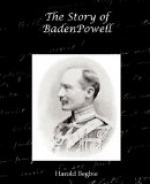And now we come to what I regard as the most important part of our hero’s life. In the last chapter I said we should have to say something about B.-P.’s big brother, the sailor, Warington, named after his grandmother, who was a Warington of Waddon Park. The very name Warington, even though it be spelled with a single ‘r,’ has an inspiring sound, and while Thackeray lives will ever be linked with all that is true and straightforward in the human heart. Imagine the reverence felt for Warington by the young brothers when he came home from a sea voyage! Not only were there the broad square shoulders, the deep chest, and the bronzed face to compel admiration; but a masterful and commanding manner withal, a stern eye and a rousing voice—and the overwhelming and crushing fact that he was a British Naval officer! Warington had been born ten years before Ste, and it is a mighty good thing for B.-P. (and he would be the first to admit it) that this was the case. For I believe that the resourcefulness of Baden-Powell is the result of the early training which he received at the hands of Warington; without that training he would have grown up a delightful and an amusing fellow, but, I suspect, as so many delightful and amusing people are, ineffective. And that is just what B.-P. is not.
You must know that in the spring holidays the boys spent their days in ranging field and copse “collecting,” riding ponies, often with their faces towards the tail-end, attending to their innumerable pets, and doing a certain amount of reading of their own free will. Ste’s study was mainly history and geology, and it was his custom to embellish the pages of the books he was reading with suitable illustrations as he went along. With these amusements, and always a good many productions of Ste’s original comedies, the spring holidays slipped away pleasantly enough. But in the summer holidays came Warington fresh from the sea, with abounding energy and indomitable will, and recreation then was of a sterner kind.
Warington had designed a yacht, a smart 5-tonner, and in supreme command of this little craft, with his brothers for the crew, and only one hired hand for the dirty work, he took the schoolboys away from the ease and comforts of home life to rough it at sea. They shipped as seamen, and as seamen they lived. It was a case of “lights out” soon after dusk, and then up again with the sun. This rule, however, was not followed with comfortable regularity, for sometimes stress of weather would find the little chaps tumbling out of their hammocks in the dead of night, and clambering upon deck with knuckles rubbing the sleep out of their eyes. All the work usually performed by seamen, with the sole exception of cooking, was done by these little chaps, and under the eagle eye of Warington it was well and truly done. Not that they showed any disposition to shirk. On the contrary, a keener crew was never shipped, but there was something in their knowledge that the skipper’s




